 WICHITA ~
WICHITA ~
AN OVERVIEW
NOTE: Except as noted, these comments are the opinions, perspectives or recollections of the author
(a local business & civic consultant,
former journalist and educator,
and former minor city official).
No guarantee of accuracy is made;
However,
a reasonable effort has been made to realistically reflect the author's understandings from a life-long familiarity and involvement
with the community.
WICHITA: A BRIEF LOOK
Overview:
Wichita is a "homey," high-tech, industrial city -- the largest city in Kansas (about 400,000 in the city, and another 200,000 in the surrounding metropolitan area) -- with a complex mix of country, midwestern and sophisticated culture.
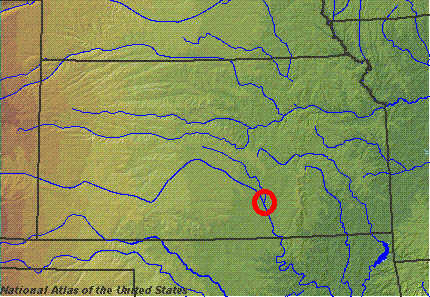
Sprawling over 150 square miles in South-Central Kansas, Wichita is centrally located on the continent, situated near the middle of the Great Plains. Wichita is quickly within reach of either coast by airlines
(or by Wichita-built light aircraft and business jets) -- but largely isolated from other major transportation routes. By car, Wichita is hours away from any major city --
(Denver or St. Louis, 10 hours;
Dallas, 6 hours,
Oklahoma City or Kansas City, 3 hours).
 Most Wichitans have a comparatively simple lifestyle, compared to the fast pace and drama of America's East and West Coasts. Hard-working people, Wichitans generally live rather basic, working-class, middle-class, or upper-middle-class lives,
in safe, comfortable, single-family houses --
at a fraction of the cost of comparable accommodations on the coasts.
Most Wichitans have a comparatively simple lifestyle, compared to the fast pace and drama of America's East and West Coasts. Hard-working people, Wichitans generally live rather basic, working-class, middle-class, or upper-middle-class lives,
in safe, comfortable, single-family houses --
at a fraction of the cost of comparable accommodations on the coasts.
Most Wichitans are conservative, and slow to embrace change -- social, political, occupational, technological, or cultural. It's often noted that "new things happen here last." Fashion doesn't find its future here. But Wichitans work hard, sometimes with creative genius, and sometimes with simple business sense, and their work has global impact:
Economy & Industry:
-
Aviation Industry:
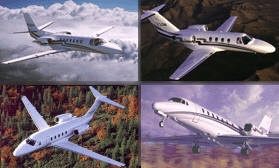 For most of its history, Wichita has been the highest-volume producer of aircraft in the world — producing heavy bombers, airliners, attack planes, spyplanes, cropdusters, ultralights, stunt planes, race planes, helicopters, drones, most of America's business jets, military trainers and seaplanes, and about half of the world supply of light planes — earning Wichita the nickname "Air Capital of the World."
For most of its history, Wichita has been the highest-volume producer of aircraft in the world — producing heavy bombers, airliners, attack planes, spyplanes, cropdusters, ultralights, stunt planes, race planes, helicopters, drones, most of America's business jets, military trainers and seaplanes, and about half of the world supply of light planes — earning Wichita the nickname "Air Capital of the World."
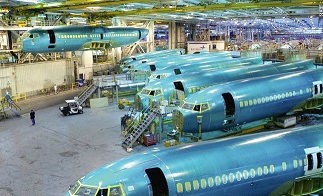 Today, Wichita is a world leader in advanced jet aircraft design, and aircraft-manufacturing technology — producing various aircraft, particularly most of America's business jets and most of the structure of the world's most popular jetliner, the Boeing 737 — and is a leading center of aerospace research, education and training.
Today, Wichita is a world leader in advanced jet aircraft design, and aircraft-manufacturing technology — producing various aircraft, particularly most of America's business jets and most of the structure of the world's most popular jetliner, the Boeing 737 — and is a leading center of aerospace research, education and training.
With numerous aircraft manufacturers and subcontractors, several airports, a major air force base, aerospace research facilities and schools, Wichita employs tens of thousands of aerospace professionals -- machinists, technicians, pilots, instructors and executives -- and is
one of America's chief employers of aerospace engineers
.
-
Other Key Industries:
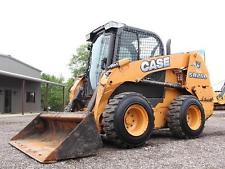 Wichita is also a site for other high-tech industries -- including equipment, software and services for computer, electronics and telecommunciations industries.
Wichita is also a site for other high-tech industries -- including equipment, software and services for computer, electronics and telecommunciations industries.
In lower-tech industry, Wichita has been a significant source for furnaces, fans and air-conditioners, and for vehicles (motorcycles to buses), construction equipment (trenchers and skid-loaders), and recreation equipment (from camping gear to ferris wheels and minature trains).

Wichita is a major part of the agri-business world, providing grains and meat to the world (home to America's 3rd largest beef producer, ethanol industry leaders, and numerous food-processing facilities, grain mills and storage elevators).
And Wichita is South-Central and Western Kansas's chief provider of healthcare, communications, transportation, finance, advanced education, and entertainment. It is also home to much of the land-development resources for the state: architects and civil engineers, contruction contractors and equipment providers, building materials suppliers, and skilled construction craftsmen.
-
 Fading Oil Empires:
Fading Oil Empires:
One example of Wichita's non-progressive tendency, though, is highlighted by Wichita's oil industry -- a holdover from its heydey in the first half of the 20th Century, when nearby oilfields drove much of Wichita's wealth. Now largely depleted, the oil fields left behind three local oil refineries (in Wichita, Augusta and El Dorado -- only the latter survives today), oil and gas processing and shipping facilities, and dozens of oil-exploration and oilfield-service companies headquartered in Wichita. While many have managed to survive on work in distant oilfields, most have vanished.
But, reflecting Wichita's sluggish pace of change, hardly any of Wichita's major fossil-fuel energy companies have managed to free themselves from that dependence, and adapt and make signficant inroads into any of the many new, growing, alternate energy industries.
One enterprise, however, flourished by becoming the key supplier to the Soviet Union's oilfields shortly after the Communist revolution in the early 1900s, then grew into an essential element of the international oil-industry infrastructure. That enterprise would become a Wichita landmark, one of America's two largest privately-held companies, and an industrial and political collossus: Koch Industries.
Firmly attached to the fading fossil fuel industry -- though recently diversifying into other raw-materials industries -- Koch Industries is the nation's (and the world's) leading fossil-fuel distribution conglomerate (chief owner of America's oil pipelines, and owner of oil and gas refineries, pipelines, storage and shipping facilities worldwide). Koch has become one of the foremost defenders of the nation's dwindling fossil-fuel industry. With its multi-billionaire principal owner and global headquarters here, employing several hundred Wichitans, the Koch enterprise is a major local influence. (For more on them, see "The Koch Effect,", on the POLITICS page.)
These are Wichita's dominant industrial leaders (the aircraft industry, particularly), but just a portion of Wichita's broad and diverse businesses and industries, which range from flour-milling and meat-cutting, to high-tech electronics -- from famous recreational products to secretive military facilities -- from religion to entertainment.
(For more on Wichita's economy & industry, see this website's
ECONOMY page.)
Wichita's People:

And Wichita's people are as diverse: ranging from poor and homeless people, to middle-class "working heroes," to skilled professionals with advanced degrees, to world-famous billionaires. From right-wing fanatics to avowed socialists, and many more in-between. Wichita is home to Americans from every state — and every major race, religion, and foreign country is represented among Wichita's people.
(For more on Wichita's people and demographics, see this site's
PEOPLE page.)
(For details on Wichita's politics, see this site's
POLITICS page.)
(For details on Wichita's lifestyle, education & culture, see this site's
LIVING page.)
Wichita's History:
(For a brief coverage of Wichita's history, in separate windows, see:
-
Planes on the Plains
,
which summarizes Wichita history from pioneer days to the end of World War II.)
-
A Glance at 150 Years of Wichita History
,
which briefly highlights some exceptional and peculiar milestones in Wichita history.)
-
History of Wichita, Kansas
,
(a more-detailed history from
Wikipedia,
the free encyclopedia.)
-
History of Wichita
,
(a short business history of Wichita from
the Wichita Regional Chamber of Commerce.)
-
Wichita Photo Archives
,
(the history of Wichita in photos, a superb array, from the local Historical Museum, Library, and Wichita State University.)
-
Wichita history in photos Side-by-side comparisons.
,
(the history of Wichita in photos, comparing historic photos of old Wichita sites with photos of their present-day situation, by the Wichita Eagle.)
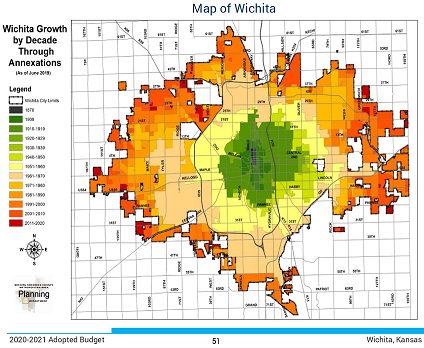
-
MAPS of Wichita History:
,
-
Wichita History Walk
,
(three guided walking tours of historic downtown/inner-Wichita, for use with a smartphone (CAUTION: Downloading unknown apps into your smartphone is a serious privacy and security risk.)).
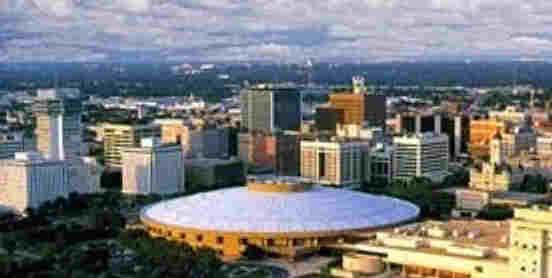
Official Websites about Wichita

Participate - Let your voice be heard!